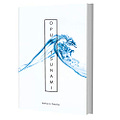Opus Tsunami 6 - Epilogue
This is the epilogue of my book Opus Tsunami. Thanks for reading. I hope you enjoyed it over the past month!
Epilogue
In some ways, the Boxing Day Tsunami changed the world for the better. In 2004 the international community reacted to the Indian Ocean disaster in a way they never have before. NGOs from around the world sprung into action, donations by the billions poured in, and world governments put aside their differences to commit their military resources to help. The silver lining to the 2004 disaster was 2005, which saw a world, heavily divided by conflict and religious strife, come together.
The International Red Cross and Red Crescent was the largest NGO on the ground in the days and months following the disaster. Their response efforts focused on Indonesia, Thailand, Maldives, and Sri Lanka, which were the four nations hardest hit by the disaster. The Red Cross/Red Crescent provided shelter, medical care, fresh drinking water, clothing, blankets, and victim registration and identification for more than 4 million people. They also helped governments in the affected areas by training staff and ensuring cash was sent to the proper recipients and not siphoned off by corruption.
Other notable NGOs to take part were CARE, Oxfam, Habitat for Humanity, Doctors Without Borders, Lions Club International, and World Vision. These NGOs helped save countless lives after the disaster, whether by fixing broken bones or distributing shoes to children, and everything in between.
In addition to NGOs were supra-national organizations, such as the United Nations and the European Union.
In fact, three of the UN’s largest organizations were instrumental in coordinating relief efforts. The UN Human Rights Commission helped reunite families, while UNICEF supplied much-needed relief for children and infants, many of whom were suddenly orphaned. The UN World Food Programme went into high gear and delivered millions of tons of food to 14 countries around the Indian Ocean.
All of the NGOs and government efforts were coordinated through the United Nations Joint Logistics Center.
Meanwhile, more than 20 countries sent military teams into devastated regions to search for survivors and ensure law and order. The US Navy sent hospital ships and aircraft carriers. In total, $6.5 billion was raised by private citizens and governments to help with disaster relief.
Myself, I did what I could. I was heavily impacted by the tsunami afterward, but it didn’t sink in right away.
Following the events of that Boxing Day, my partner and I caught a water taxi to the mainland. We hitched a ride in the back of a Toyota pickup truck driven by a couple of Thai men, and they took us to another beach. I don’t even know which beach we landed on but the locals were busy putting up their patios and cleaning up the mess.
A nice Thai family invited us to stay with them. The damage here didn’t seem significant at all, and there was even a small Internet cafe at the back of a convenience store on the “main strip” of this little Thai town. We booked tickets on Thai Airways back to Bangkok for the earliest date — Jan 1st. After that, we bunked down with this beautiful family.
Keep reading with a 7-day free trial
Subscribe to The Drescher Drop to keep reading this post and get 7 days of free access to the full post archives.



